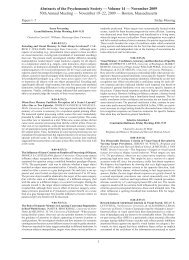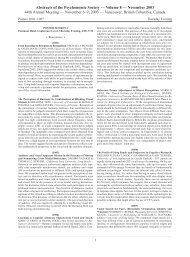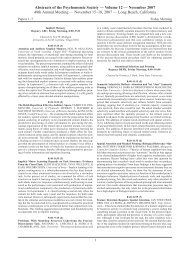Abstracts 2005 - The Psychonomic Society
Abstracts 2005 - The Psychonomic Society
Abstracts 2005 - The Psychonomic Society
You also want an ePaper? Increase the reach of your titles
YUMPU automatically turns print PDFs into web optimized ePapers that Google loves.
Posters 5114–5120 Saturday Evening<br />
(e.g., “couch”). <strong>The</strong>se effects indicate that manipulation features are<br />
an intrinsic part of the lexical-semantic representation of objects.<br />
<strong>The</strong>se results are compared with fixation patterns of apraxic patients<br />
who have deficits in producing and comprehending voluntary movements,<br />
in order to determine whether such deficits result in a concomitant<br />
impairment in the lexical-semantic representation of manipulable<br />
objects.<br />
(5114)<br />
Priming Effects Without Semantic or Associative Links Through<br />
Collocation. WILLIAM J. BONK & ALICE F. HEALY, University of<br />
Colorado, Boulder (sponsored by L. E. Bourne, Jr.)—This study investigates<br />
priming effects for verb–object collocate pairs (e.g., “pay attention”);<br />
such words tend to co-occur by linguistic convention, rather than<br />
by meaning. <strong>The</strong> words in collocate pairs do not share semantic features,<br />
and do not cue each other in association norm tasks. In this experiment,<br />
naming times for targets preceded by established collocates are<br />
compared with those for unrelated words and for neutral primes (the<br />
word “blank”) in both forward (verb–noun) and backward (noun–verb)<br />
conditions. Collocationally related words provided automatic priming<br />
effects, as compared with both the neutral and the unrelated prime words<br />
as baselines. This finding supports the hypothesis that words automatically<br />
make their conventional partners active in memory, potentially facilitating<br />
both language comprehension and production. It appears that<br />
this activation is not semantically based but is, rather, the result of<br />
experience-based direct connections between lexical entries in memory.<br />
(5115)<br />
Two Stages of Sentence Comprehension in Patients with Alzheimer’s<br />
Disease. GLORIA S. WATERS, Boston University, & DAVID N. CAP-<br />
LAN, Massachusetts General Hospital—<strong>The</strong> sentence comprehension<br />
abilities of patients with dementia of the Alzheimer’s type (DAT) and<br />
age- and education-matched controls were assessed using a sentence<br />
acceptability and a sentence plausibility judgment task. <strong>The</strong> stimulus<br />
materials were created so that the acceptability judgments could be<br />
made simply on the basis of syntactic acceptability, whereas a search<br />
of real-world knowledge was required for plausibility judgments. Syntactic<br />
complexity of the stimulus materials was also manipulated in<br />
both tasks. Performance of the patients was poorer than that of the<br />
control subjects. All subjects performed more poorly on the plausibility<br />
task than on the acceptability task. However, differences between<br />
the tasks were much greater for DAT patients than for control<br />
subjects. <strong>The</strong> results are interpreted as showing evidence that DAT patients<br />
are much more sensitive to increases in processing load at two<br />
stages of sentence comprehension.<br />
(5116)<br />
When Good Enough Parsing Is Not Good Enough: Error Signals and<br />
Reanalysis. KIEL CHRISTIANSON, University of Illinois, Urbana-<br />
Champaign, & TIMOTHY J. SLATTERY, University of Massachusetts,<br />
Amherst—In experiments exploring garden path sentences (GPs), such<br />
as “While the man hunted the deer ran into the woods,” Christianson<br />
et al. (2001) discovered that interpretations derived from GPs are often<br />
not faithful to the input. Instead, interpretations reflect lingering effects<br />
of the initial GP parse. In this study, eye movements were recorded as<br />
participants read GPs and non-GPs containing commas, followed by,<br />
for example, “<strong>The</strong> man was hunting a deer (bear) in the woods.” <strong>The</strong><br />
results showed classic GP effects of longer reading times (RTs) and<br />
more regressions in the GPs. When the noun in the subsequent sentence<br />
did not match the previous one, RTs and regressions increased,<br />
suggesting lingering effects of the GP, in addition to large effects of<br />
the noun mismatch. RTs on the mismatched noun did not differ as a<br />
function of the GP, however. We discuss the results in terms of “good<br />
enough” syntactic and semantic representations.<br />
(5117)<br />
Arriving and Struggling the Veterinarian: Lexical Guidance in<br />
Parsing, Revisited. ADRIAN STAUB & CHARLES E. CLIFTON, Uni-<br />
140<br />
versity of Massachusetts, Amherst—Several previous studies (Adams,<br />
Clifton, & Mitchell, 1998; Mitchell, 1987; van Gompel and Pickering,<br />
2001) have examined whether readers experience processing difficulty<br />
on a noun phrase immediately following an intransitive verb,<br />
with inconclusive results. In an eyetracking experiment, we explored<br />
the hypothesis that a relevant factor is whether the intransitive verb is<br />
an unaccusative (e.g., arrive) or an unergative (e.g., struggle). We suspected<br />
that readers might experience more difficulty with unergatives<br />
than with unaccusatives, since the underlying syntax of unaccusatives<br />
categorically prohibits a direct object. In fact, we found that readers<br />
experienced significant difficulty on a postverbal noun phrase with<br />
each type of intransitive, as compared with transitive verbs, as reflected<br />
in both first-pass and go-past reading times. Furthermore, the<br />
two verb types did not differ significantly from each other. <strong>The</strong>se results<br />
support parsing theories holding that the parser does not initially<br />
make use of verb argument structure information.<br />
(5118)<br />
Unrepairable Garden Paths Reveal Reanalysis Processing. FER-<br />
NANDA FERREIRA & EDWARD M. HUSBAND, Michigan State<br />
University (sponsored by Fernanda Ferreira)—<strong>The</strong> time course of reanalysis<br />
processes in sentence comprehension was examined in two<br />
experiments using a modified version of the speed–accuracy tradeoff<br />
design. <strong>The</strong> first experiment used experimenter-paced phrase-byphrase<br />
visual presentation, and the second used a saccade-contingent<br />
self-paced visual presentation. Subjects made rapid acceptability<br />
judgments when prompted by a beep at one of four delays after reading<br />
the disambiguating phrase. A second judgment, without time pressure,<br />
followed the speeded response. <strong>The</strong> results from both acceptability<br />
judgments and eye movement behavior suggest that reanalysis<br />
includes a lexical reaccess step for garden paths involving alternative<br />
verb argument structures, but not for those that require just structural<br />
revisions. <strong>The</strong> results are consistent with reprocessing views of reanalysis<br />
and provide indirect support for serial models of initial parsing.<br />
(5119)<br />
Relative Clause Comprehension in Mandarin. YOWYU LIN &<br />
SUSAN M. GARNSEY, University of Illinois, Urbana-Champaign—<br />
Speakers of both English and Japanese find object-relative clauses<br />
harder to understand than subject relatives. Although these languages<br />
differ in many ways (default word order, whether relative clauses follow<br />
or precede the head nouns they modify, etc.), they have in common<br />
that subject relatives follow the default word order pattern,<br />
whereas object relatives do not. In contrast, in Mandarin, it is object<br />
relatives that have the default word order, leading Hsiao and Gibson<br />
(2003) to predict that they should be easier in Mandarin; they collected<br />
reading time data that provided weak support for their prediction.<br />
In two Mandarin reading time studies, we found and replicated<br />
robust support for this prediction, but we also found that differences<br />
between subject and object relatives disappeared when head nouns<br />
were less confusable with other nouns in the sentences, consistent<br />
with Lewis’s (1999) claims about the role of similarity-based interference<br />
during sentence comprehension.<br />
(5120)<br />
Effects of Event Possibility and Likelihood on Eye Movements in<br />
Reading. TESSA C. WARREN & KERRY A. MCCONNELL, University<br />
of Pittsburgh—Eye movement reactions to semantic anomalies<br />
provide information about the time course over which different<br />
sources of information become available to the language comprehension<br />
system during reading (Rayner, Warren, Juhasz, & Liversedge,<br />
2004). Although many studies have investigated the impact of anomaly<br />
severity on eye-movement latencies (e.g., Murray & Rowan, 1998;<br />
Rayner et al., 2004), little work has investigated effects of sources of<br />
information, such as event likelihood or possibility, that contribute to<br />
anomalies (cf. Hagoort, Hald, Bastiaansen, & Petersson, 2004). This<br />
experiment recorded eye movements over sentences with a possible<br />
and likely event, sentences with a possible but extremely unlikely





